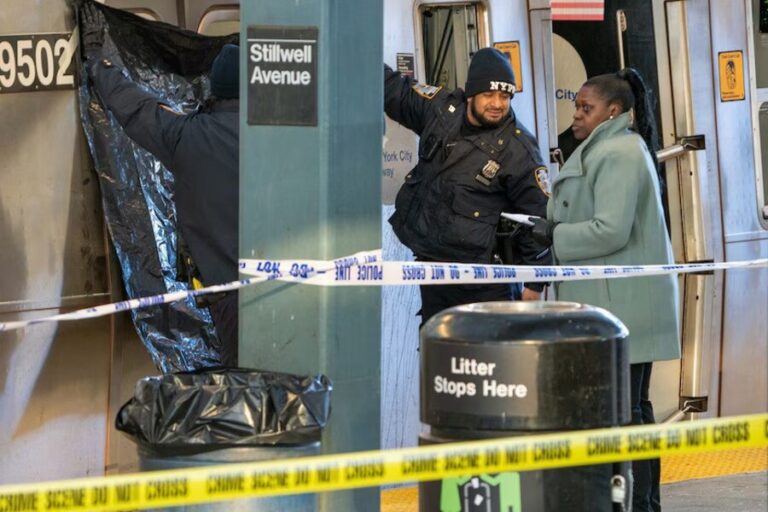A horrifying tragedy unfolded in New York City when 57-year-old Debrina Kawam, a woman from Toms River, New Jersey, was identified as the victim of a gruesome subway attack. Kawam, who had been sleeping on a stationary F train at Brooklyn’s Coney Island-Stillwell Avenue station on December 22, was set ablaze in what police have described as a senseless act of violence.
The suspect, Sebastian Zapeta, a 33-year-old undocumented immigrant from Guatemala, has been charged with first-degree and second-degree murder and first-degree arson. Authorities allege that Zapeta used a lighter to ignite Kawam while she slept. The motive for the crime remains under investigation, and Zapeta has not yet entered a plea.
Brooklyn District Attorney Eric Gonzalez called the attack a horrific and depraved crime. “The depravity of this horrific crime is beyond comprehension, and my office is committed to bringing the perpetrator to justice,” Gonzalez said in a statement. “This gruesome and senseless act of violence against a vulnerable woman will be met with the most serious consequences.”
According to the New York Police Department, officers stationed near the subway platform detected smoke and quickly responded. Upon reaching the train, they found Kawam standing inside a subway car engulfed in flames. Tragically, she was pronounced dead at the scene.
Authorities report that Zapeta remained at the scene after the attack, sitting on a nearby bench. His image was captured on officers’ body cameras, which police later released to solicit public assistance in identifying him. Three high school students recognized Zapeta and contacted law enforcement, leading to his swift arrest at a subway car in Herald Square. When taken into custody, Zapata was found with a lighter in his pocket.
New York City Mayor Eric Adams revealed that Kawam had briefly stayed in a city homeless shelter. He expressed his condolences to her family, emphasizing the tragedy of her death. “Our hearts go out to the family,” Adams said. “This was a horrific incident to have to live through.”
The mayor also pointed to the broader issue of homelessness in the subway system. “People should not be living on our subway system. They should be in a place of care. And no matter where she lived, that should not have happened,” he said.
Zapeta’s immigration status has added another layer of controversy to the case. According to U.S. Immigration and Customs Enforcement (ICE), Zapata was previously deported to Guatemala in June 2018 after being apprehended by the U.S. Border Patrol in Sonoita, Arizona. He later reentered the United States unlawfully at an unknown time and location.
Following his arrest, ICE’s Enforcement and Removal Operations announced plans to lodge an immigration detainer with the NYPD to ensure Zapeta remains in custody. This detail has reignited debates over immigration enforcement and its role in preventing violent crime.
The shocking nature of Kawam’s death has left many New Yorkers grappling with fear and anger. Mayor Adams acknowledged that such high-profile incidents, though rare, significantly impact public perception of safety in the city’s transit system.
“It was just a bad incident, and it impacts how New Yorkers feel,” Adams said. “But it reinforces what I’ve been saying: People should not be living on our subway system.”
Despite the high-profile nature of this crime, Adams highlighted that overall crime in the subway system has decreased. According to NYPD statistics, subway crime is down 5.4% compared to the previous year. However, incidents like Kawam’s murder underscore the challenges of addressing both public safety and homelessness in one of the world’s busiest transit systems.
Kawam’s tragic death has sparked renewed calls for stronger support systems for vulnerable populations, including those experiencing homelessness. Advocates argue that providing adequate housing, mental health care, and social services is critical to preventing such tragedies.
The case also raises questions about the effectiveness of current immigration policies and their enforcement. Critics of the system have called for reforms to address the gaps that allow previously deported individuals to reenter the country undetected.
As the investigation continues, authorities remain committed to seeking justice for Kawam. The charges against Zapeta reflect the gravity of the crime, and Brooklyn District Attorney Gonzalez has vowed to prosecute the case to the fullest extent of the law.
The attack serves as a stark reminder of the vulnerabilities faced by many living on the margins of society and the urgent need for comprehensive solutions to address homelessness, mental health, and public safety. Kawam’s death is a profound tragedy that has left a lasting impact on New York City, reinforcing the importance of community efforts to protect and uplift its most vulnerable members.
